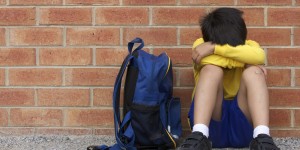Bullying is a form of aggressive behavior in which someone intentionally and repeatedly causes another person injury or discomfort. Bullying can take the form of physical contact, words or more subtle actions.
The bullied individual typically has trouble defending him or herself and does nothing to “cause” the bullying.
The experience of being bullied can end up causing lasting damage to victims. This is both self-evident, and also supported by an increasing body of research. It is not necessary to be physically harmed in order to suffer lasting harm. Words and gestures are quite enough. What is far more difficult to mend is the primary wound that bullying victims suffer which is damage to their self-concepts; to their identities. Bullying is an attempt to instill fear and self-loathing. Being the repetitive target of bullying damages your ability to view yourself as a desirable, capable and effective individual.
Being bullied makes you increasingly susceptible to becoming depressed and/or angry and/or bitter. This act of being bullied teaches you that you are undesirable, not safe in the world, and (when it is dished out by forces that are physically superior to yourself) that you are relatively powerless to defend yourself. When you are forced, again and again, to contemplate your relative lack of control over the bullying process, you are being set up for Learned Helplessness (e.g., where you come to believe that you can’t do anything to change your ugly situation even if that isn’t true), which in turn sets you up for hopelessness and depression. You are also learning how you are seen by bullies, which is to say, you’re learning that you are seen by others as weak, pathetic, and a loser. And, by virtue of the way that identity tends to work, you are being set up to believe that these things the bullies are saying about you are true.
Among a large group of children in England, those who were bullied were 60% more likely to have mental health problems as adults than were those who suffered physical, emotional or sexual abuse. And among a large group of children in the United States, the risk of mental health problems was nearly four times greater for victims of bullying than for victims of child abuse.
Previous studies have shown that children who are abused by adults or victimized by their peers grow up to suffer higher rates of depression, anxiety and suicidal ideation, among other problems. Overall, the effects of bullying were worse.
Short Term Effects of Bullying
- Anger
- Depression
- Anxious avoidance of settings in which bullying may occur.
- Greater incidence of illness
- Lower grades than non-bullied peers
- Suicidal thoughts and feelings
Effects on Kids Who are Bullied
Kids who are bullied can experience negative physical, school, and mental health issues. Kids who are bullied are more likely to experience:
- Depression and anxiety, increased feelings of sadness and loneliness, changes in sleep and eating patterns, and loss of interest in activities they used to enjoy. These issues may persist into adulthood.
- Health complaints
- Decreased academic achievement—GPA and standardized test scores—and school participation. They are more likely to miss, skip, or drop out of school.
Effects on Kids Who Bully Others
Kids who bully others can also engage in violent and other risky behaviors into adulthood. Kids who bully are more likely to:
- Abuse alcohol and other drugs in adolescence and as adults
- Get into fights, vandalize property, and drop out of school
- Engage in early sexual activity
- Have criminal convictions and traffic citations as adults
- Be abusive toward their romantic partners, spouses, or children as adults
Effects on Bystanders
Kids who witness bullying are more likely to:
- Have increased use of tobacco, alcohol, or other drugs
- Have increased mental health problems, including depression and anxiety
- Miss or skip school
Long Term Effects of bullying
- Reduced occupational opportunities
- Lingering feelings of anger and bitterness, desire for revenge.
- Difficulty trusting people
- Interpersonal difficulties, including fear and avoidance of new social situations
- Increased tendency to be a loner
- Perception of self as easy to victimize, overly sensitive, and thin-skinned
- Self-esteem problems (don’t think well of self)
- Increased incidence of continued bullying and victimization

